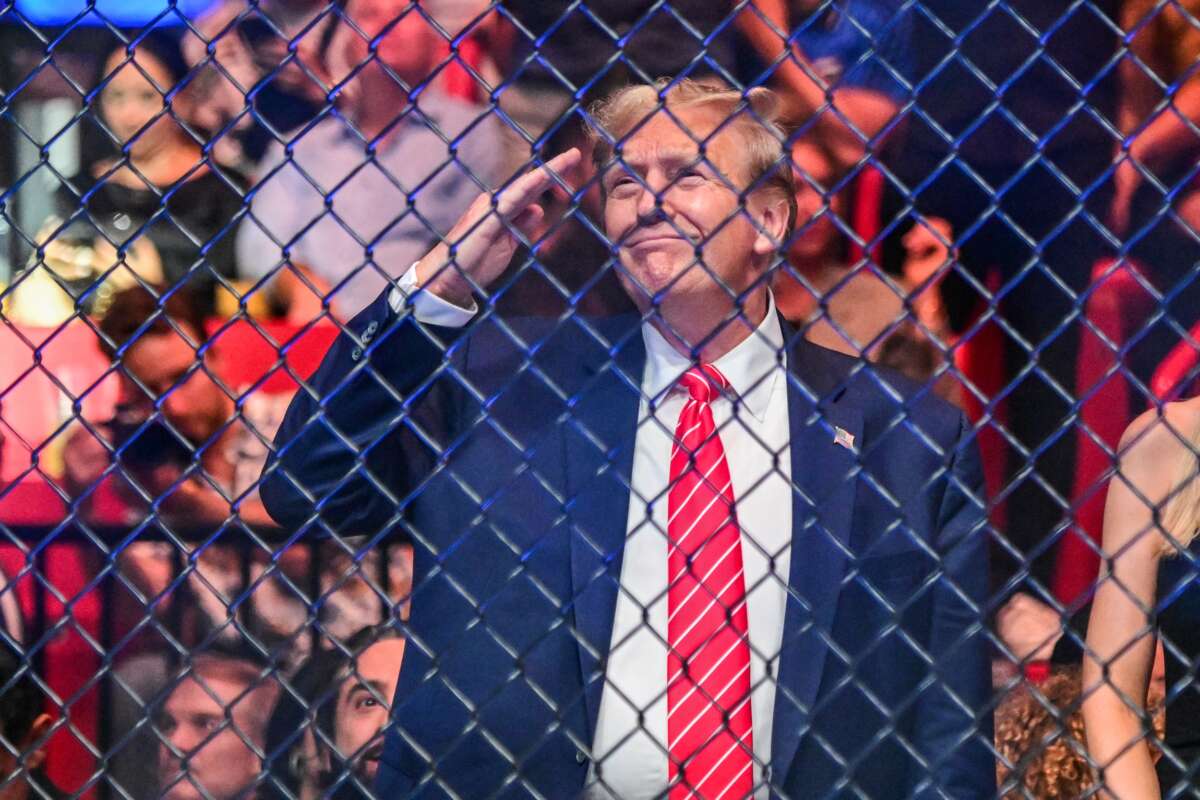A new poll — published the same week that former President Donald Trump submitted a brief to the U.S. Supreme Court regarding his “presidential immunity” claims that he believes should shield him from prosecution — shows that the vast majority of Americans reject those arguments.
Trump faces four indictment charges from the Department of Justice (DOJ) regarding his attempts to subvert the results of the 2020 presidential election. Trump, who is the GOP nominee for president in 2024, is requesting that the Supreme Court reject the case altogether, claiming that former presidents should not be held accountable for their actions while in office, even if those actions could be deemed illegal.
Remarkably, Trump’s lawyers, during arguments in January before the District of Columbia Court of Appeals, suggested that “presidential immunity” should be limitless — when questioned whether a former president should be indicted for assassinating a political rival, for example, Trump’s lawyer John Sauer responded by stating that a president should only be charged with a crime if they’ve been impeached for it beforehand.
Perhaps unsurprisingly, Americans oppose these types of arguments. In a Politico/Ipsos poll that was published on Monday, respondents were asked whether presidents should be immune from criminal prosecutions of crimes they committed while in office. Only 11 percent believed they should be, with 70 percent of Americans saying that presidents should not receive such protections.
Even a plurality of Republicans disagreed with the notion that Trump’s legal team is putting forward — nearly one in two GOP voters in the poll (48 percent) said that presidential immunity shouldn’t extend to ex-presidents when they commit a crime, with only one in four Republican voters (24 percent) saying that presidents should receive such protections.
On Tuesday, Trump submitted his legal brief to the Supreme Court. In it, his lawyers continued pressing the argument that presidents must have absolute immunity in order to ensure they can function in office without fear of being criminally charged by their political enemies after leaving the White House.
Trump’s lawyers made this claim despite the fact that such a scenario has never taken place, writing:
A denial of criminal immunity would incapacitate every future President with de facto blackmail and extortion while in office, and condemn him to years of post-office trauma at the hands of political opponents.
However, there are glaring issues within the brief that the DOJ will likely take note of when it submits its response brief. Trump cites the Supreme Court case Marbury v. Madison, which, among other outcomes, gave the Court the right to exercise judicial review.
Trump argues that the Marbury ruling from two centuries ago ensures that presidents cannot be challenged for their actions while in office.
“In Marbury v. Madison, this Court held that a President’s official acts ‘can never be examinable by the courts,'” Trump’s legal brief stated.
That brief contains a major omission, however: In actuality, the passage in Marbury that Trump cites says that “The acts of [a president], as an officer, can never be examinable by the courts.” (Bold added for emphasis.)
CNN legal analyst Norm Eisen called out the Trump team for misinterpreting Marbury on social media.
“[Trump] gets Marbury backwards. It does not absolutely insulate presidents from judicial oversight — it empowers the courts to reject lunacy like Trump’s proposed absolute immunity,” Eisen wrote on X.
Other legal minds were also doubtful of the brief’s assertions, including NBC News legal correspondent Glenn Kirschner.
“There is no law, there is no precedent, no appelate court opinion, there is no Constitutional provision that supports” Trump’s arguments, Kirschner said. “Indeed, the Constitution provides the exact opposite.”
In agreeing to hear the case last month, the Supreme Court requested that both the Trump team and the DOJ address “Whether and if so to what extent does a former president enjoy presidential immunity from criminal prosecution for conduct alleged to involve official acts during his tenure in office.”
Most legal experts doubt that the Court will accept Trump’s views on presidential immunity, but the justices did toss him a lifeline in agreeing to take up the case, as their doing so delayed the start of Trump’s election subversion trial, which was supposed to begin this month. Instead, oral arguments before the Court won’t begin until late April, after which time it’s unclear as yet when an opinion on the case will be rendered — it’s possible that a decision could be issued within days of those arguments, but it could also take months before a ruling is issued, delaying the trial even longer.
If the trial doesn’t happen before the 2024 race, and if Trump defeats President Joe Biden in their rematch, Trump could feasibly upend the case altogether by appointing an attorney general who could drop all federal charges against him.
Most Americans are opposed to such an outcome. According to the Politico/Ipsos poll mentioned above, nearly 6 in 10 Americans (59 percent) say the election subversion trial against Trump should take place before the presidential election, with only 2 in 10 (19 percent) saying it shouldn’t happen before then.
Press freedom is under attack
As Trump cracks down on political speech, independent media is increasingly necessary.
Truthout produces reporting you won’t see in the mainstream: journalism from the frontlines of global conflict, interviews with grassroots movement leaders, high-quality legal analysis and more.
Our work is possible thanks to reader support. Help Truthout catalyze change and social justice — make a tax-deductible monthly or one-time donation today.
